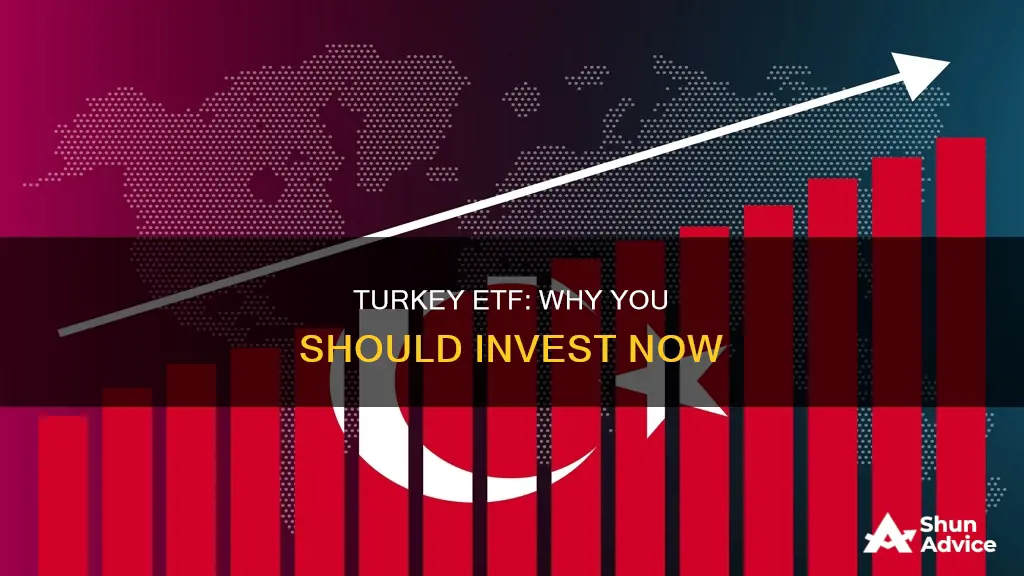
Turkey's economy has been an emerging market investment darling, with its benchmark stock index, the BIST 100 index, surging 48% in 2017, making it one of the best-performing stock markets in the world that year. The iShares MSCI Turkey ETF is the ETF with the most exposure to Turkey and attempts to match the performance of the MSCI Turkey Investable Market Index. The ETF has a 50-stock portfolio that includes small-, mid- and large-capitalization Turkish stocks that trade on the Istanbul Stock Exchange. The ETF has an annual management fee of 0.59% and is one of the cheapest Turkey ETFs by total expense ratio (TER).
What You'll Learn

Low-cost entry to the Turkish market
ETFs are a great way to gain exposure to the Turkish market at a low cost. The iShares MSCI Turkey ETF, for example, offers investors a way to track the performance of the MSCI Turkey Investable Market Index or the MSCI Turkey IMI 25/50 Index, which consists of Turkish large-, mid- and small-capitalization stocks. With an expense ratio of 0.59% and a 0.45% to 0.74% annual total expense ratio (TER), it is a cost-effective way to gain access to a broad range of Turkish companies.
ETFs provide an easy and low-cost entry point to investing in the Turkish stock market. By purchasing an ETF, investors can gain exposure to a basket of Turkish stocks, rather than purchasing individual stocks, which can be more costly and time-consuming. The broad market index approach allows for a diverse range of Turkish equities to be held in a portfolio, providing a comprehensive view of the market.
The Turkish market has had its ups and downs, with a surge in 2017 that made it one of the best-performing stock markets globally. This was fuelled by the country's declining currency, the lira, and foreign currency debt. While there have been subsequent crises and concerns about the central bank's policies, the Turkish market still offers attractive investment opportunities, especially for those seeking emerging market exposure.
The iShares MSCI Turkey ETF is a popular choice for investors looking for Turkish exposure, with net assets of $329.50 million as of February 2021. It provides access to a range of Turkish companies, with a focus on the financial sector, which accounted for nearly a quarter of the fund's portfolio.
In summary, ETFs offer a low-cost entry point to the Turkish market, providing diverse exposure to a broad range of Turkish equities. With their low fees and broad market access, they are a compelling option for investors seeking to invest in Turkey.
Invest Wisely: SP500 ETF Strategies for Beginners
You may want to see also

Exposure to a broad range of Turkish companies
By investing in Turkey ETFs, investors can gain exposure to a variety of sectors within Turkey, including financials, industrials, consumer cyclicals, and more. This diversification can help reduce the risk associated with investing in a single company or industry and provide a more comprehensive view of the Turkish market.
Additionally, Turkey ETFs provide a cost-effective way to invest in the Turkish market. The annual expense ratios for Turkey ETFs are typically low, ranging from 0.45% to 0.74% per annum, making them an affordable option for investors.
Turkey ETFs, such as the iShares MSCI Turkey ETF, offer a convenient and diversified way to gain exposure to a broad range of Turkish companies, providing investors with the opportunity to participate in the country's economic growth and potential returns.
ETFs: A Smart Way to Invest in Commodities
You may want to see also

Access to Turkish stocks
The iShares MSCI Turkey ETF is an exchange-traded fund (ETF) that offers investors exposure to a broad range of Turkish stocks. The ETF seeks to track the performance of the MSCI Turkey Index, which includes large-, mid-, and small-capitalisation Turkish stocks listed on the Istanbul Stock Exchange.
This ETF provides a low-cost and convenient way to gain access to the Turkish stock market, which can be attractive to investors looking for diversification and exposure to the country's economy. The fund's top holdings include companies in the financial, consumer discretionary, and industrial sectors, providing a diverse range of investments within Turkey.
The iShares MSCI Turkey ETF is just one example of a Turkey-focused ETF, and there are other options available that provide similar access to Turkish stocks. These include the Amundi MSCI Turkey UCITS ETF Acc and the First Trust Emerging Markets Small Cap AlphaDEX Fund, which also have significant allocations to Turkish equities.
By investing in Turkish stocks through ETFs, investors can gain exposure to the country's economic growth and development, benefiting from the performance of a diverse range of Turkish companies. This provides an opportunity for investors to participate in the potential upside of the Turkish market while managing their risk through the diversified nature of ETFs.
Saudi Arabia ETF: A Guide to Investing
You may want to see also

Performance of Turkish stocks
The performance of Turkish stocks has varied in recent years, with the country's benchmark stock index, the BIST 100 index, surging by 48% in 2017, making it one of the best-performing stock markets in the world during that year. This strong performance was attributed to the country's declining currency, the lira, which made Turkish exports more competitive in the global market.
However, Turkey's economy has also faced challenges, particularly due to its reliance on foreign currency debt, which has led to deficits in the country's fiscal and current accounts. As of December 2019, Turkey's external currency debt accounted for about 57% of its gross domestic product (GDP). This has resulted in concerns about the country's ability to service its foreign debt, particularly in the context of a devalued lira.
In recent years, Turkey-specific ETFs, such as the iShares MSCI Turkey ETF, have experienced a mix of positive and negative returns. As of February 2021, the iShares MSCI Turkey ETF had five- and three-year annualized returns of -3.54% and -12.82%, respectively. However, it's important to note that past performance does not guarantee future results, and the returns can fluctuate over time.
As of December 2024, the iShares MSCI Turkey ETF had a year-to-date (YTD) return of 18.10%, indicating a positive performance for that particular year. The ETF seeks to track the investment results of a broad-based index composed of Turkish equities, providing exposure to a broad range of companies in the country.
Overall, investing in Turkish stocks through ETFs offers access to the large-, mid-, and small-capitalization segments of the Turkish equity market. However, it's important to carefully consider the risks and potential impacts of factors such as currency fluctuations and economic policies on the performance of Turkish stocks and related ETFs.
A Guide to Investing in the HMMJ ETF
You may want to see also

Turkey's troubled currency
Turkey's economy has been characterised by a weak and volatile currency, the lira, which has experienced a significant loss in value since 2018. This has been driven by a combination of factors, including current account deficits, high foreign-currency debt, and political tensions with the United States.
Causes of Turkey's Currency Troubles
Turkey's currency woes can be attributed to a range of economic and political factors:
- Current Account Deficits: Turkey has been running large and growing current account deficits for years, reaching US$7.1 billion in January 2018, one of the largest in the world. This has been funded by capital inflows, with Turkish banks and firms borrowing heavily in foreign currencies.
- Foreign-Currency Debt: Turkey's economy has been fuelled by foreign-currency debt, which has resulted in deficits in its fiscal and current accounts. By December 2019, Turkey's external currency debt accounted for about 57% of its gross domestic product (GDP).
- Political Tensions: Turkey's relationship with the United States has been strained due to disputes such as the detention of American pastor Andrew Brunson, which led to economic sanctions and tariffs imposed by the Trump administration. These tensions have contributed to the decline in the value of the lira.
- Presidential Interference: President Recep Tayyip Erdoğan's interference with the central bank's monetary policy has been cited as a factor in the lira's decline. Erdoğan's unorthodox interest rate theories and opposition to interest rate hikes have been at odds with the recommendations of economists and international investment circles.
- Authoritarianism and Geopolitical Frictions: Erdoğan's increasing authoritarianism and geopolitical frictions with countries like the United States have also contributed to the leveraging effects of the currency crisis.
Impact of Turkey's Troubled Currency
The consequences of Turkey's troubled currency have been far-reaching:
- Economic Crises: Turkey has faced economic crises characterised by high inflation, rising borrowing costs, and loan defaults.
- Banking Sector Strain: Turkish banks have faced challenges due to the loss of value of the lira, with a decline in their asset quality and capital adequacy ratios.
- Business and Consumer Impact: Businesses and consumers have been affected by higher interest rates on loans, curbing demand and leading to incomplete or unoccupied housing and commercial real estate projects.
- Social Impact: There have been reports of suicides and financial hardships among Turkish citizens due to rising costs of living, with increasing prices of electricity and high youth unemployment.
- International Impact: Turkey's currency crisis has had international repercussions, impacting lenders exposed to Turkish debt and contributing to financial contagion risks in other emerging economies.
South Africa's Best ETFs: Where to Invest?
You may want to see also
Frequently asked questions
The easiest way to invest in the Turkish stock market is to invest in a broad market index at a low cost using ETFs.
As of 2021, the best Turkey ETFs by 1-year return are the Amundi MSCI Turkey UCITS ETF Acc and the iShares MSCI Turkey UCITS ETF.
The cheapest Turkey ETFs by total expense ratio (TER) are the Amundi MSCI Turkey UCITS ETF Acc and the iShares MSCI Turkey UCITS ETF.







